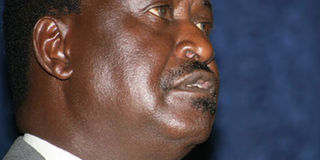Raila calls for Africa unity

Former Prime Minister Raila Odinga. He has called on Africa’s leaders to put greater emphasis on a continental unity that promotes respect for human rights and dignity, economic prosperity, national unity and homeland security. Photo/File
What you need to know:
- Mr Odinga called on AU to stand up against its members who are reversing the tide of democratisation
- He said a united stand, directed at more relevant causes, could ensure access for Africa's agriculture and commodities to developed economies and that the continent’s natural resources are extracted and developed in Africa instead of being exported as raw materials at throw away prices.
BOSTON
Former Prime Minister Raila Odinga has called on Africa’s leaders to put greater emphasis on a continental unity that promotes respect for human rights and dignity, economic prosperity, national unity and homeland security.
Delivering a lecture at Boston University in Massachusetts, Raila also called on Kenya’s friends in the US to lobby for the increase of the number of Kenyan youth who qualify to be considered to take part in President Obama’s new Young Leadership programme.
The programme initiated by the White House brings Africa’s most promising young leaders to US universities annually to exchange ideas and also train in public management, business and civic leadership.
“We in Kenya know what such exchanges can do for a nation. We know what the airlifts initiated by J.F. Kennedy did to put our country ahead of the pack in Africa. It is my hope that Kenyan youth will get chances on this programme and those of you here will be our ambassadors,” he said.
On the continent’s prospects, Mr Odinga called on AU to stand up against its members who are reversing the tide of democratisation and creating the impression that Africa is stuck in the past, unstable and unpredictable and therefore unsuitable for investment.
Mr Odinga lamented that while a handful of African states has kept the faith in democracy and is marching steadily in that direction, another group is holding the continent back and giving it a bad name.
He cited Botswana, Senegal, Ghana, South Africa, Tanzania and Namibia as some of the nations marching forward and reaping the reward of investments.
“I speak out against the reversals and gains in Africa because they paint a picture that has a direct impact on Africa’s economic growth. They indicate how unpredictable Africa can be. There is a common joke that no one can tell with certainty how an African country will wake up in a day, a month, and a year.
"Unpredictability is an enemy of investment and trade,” he said adding, “This is the company I have been urging my country Kenya not to join and not to keep because Kenya has always marched on by confronting its problems head-on, not by inventing excuses.”
Mr Odinga who delivered a lecture on Africa Now: the Prospects and Fears of a Continent, said he has nothing against Africa’s unity or the AU.
“In fact, I am a product and a beneficiary of an Africa that once stood together. In my autobiography, you will find instances when I, just like my late father, travelled on passports of different countries, not Kenya. I am a product of the kindness and unity of Africa in a bygone era,” Mr Odinga said but added that Africa’s unity is being channelled to causes that add little value for the citizens.
LIBERALISE MARKETS
He called on leaders to be equally enthusiastic in demanding that as the Continent liberalises its markets in line with the demands of the global village, it gets reciprocal concessions from mature economies.
He said a united stand, directed at more relevant causes, could ensure access for Africa's agriculture and commodities to developed economies and that the continent’s natural resources are extracted and developed in Africa instead of being exported as raw materials at throw away prices.
“There is no reason why Africa should export iron ore then import steel. We should be processing our iron ore here, or we should insist that those who want it set up plants in Africa and export a finished product.”
Mr Odinga said that while Africa’s leaders are still blaming colonialism for the continent’s woes, majority of the citizens of Africa are younger than the continent, which turned 50 this year, with sixty per cent of Africans today being under the age of 30.
“This young population knows little or nothing about colonialism. You get the feeling that they also don’t care whether Africa was colonised or not. All they want is a sure path to a secure and prosperous future. What this means is that there exists a disconnect between the leaders and the larger section of citizens."
Mr Odinga delivered the lecture at the invitation of the African Presidential Centre at end of his two-week tour of the US.





